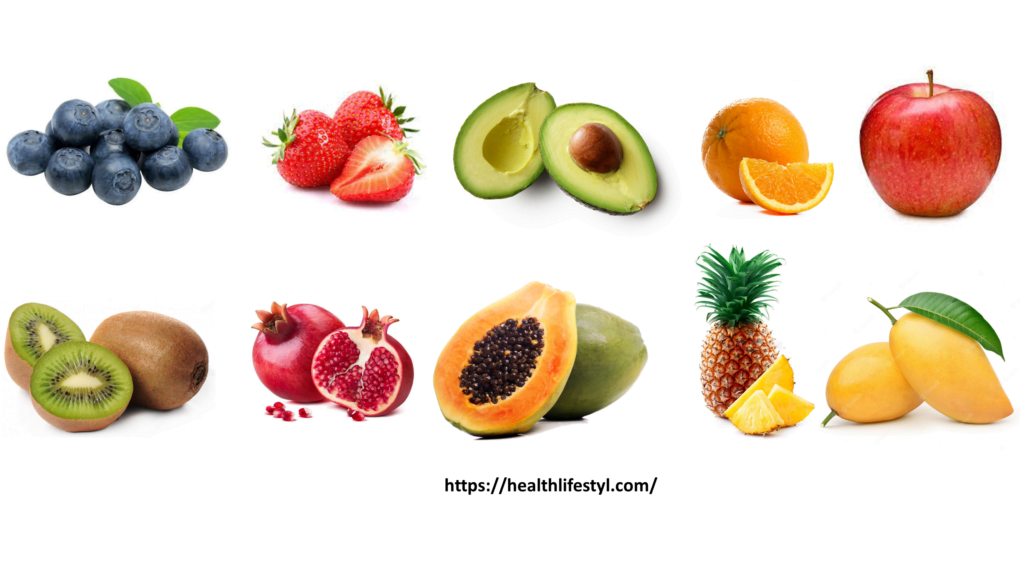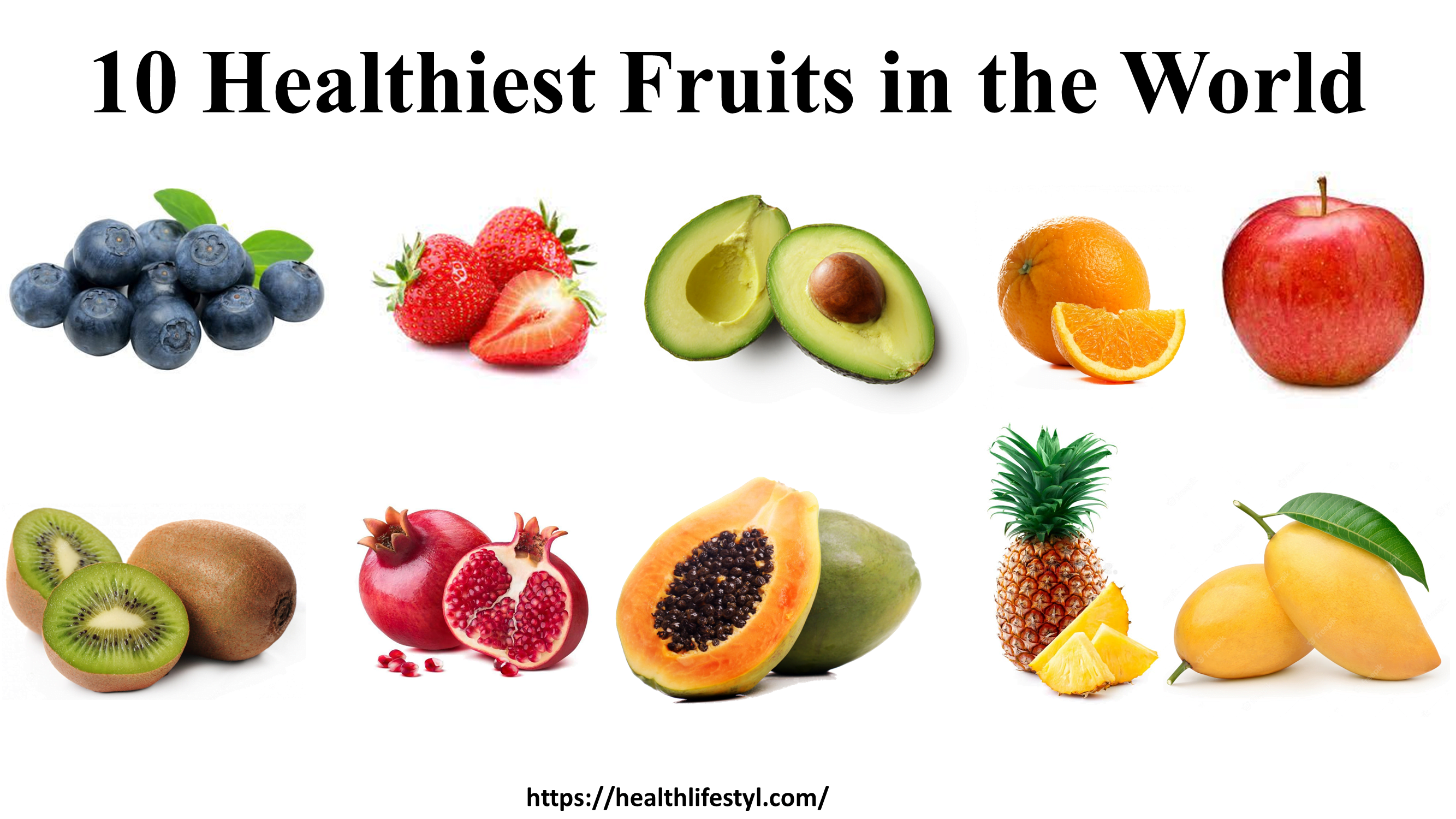Fruits are the edible reproductive structures of flowering plants. They are generally sweet or sometimes sour in taste and are typically consumed as a refreshing and nutritious part of our diet. Fruits come in a variety of shapes, sizes, colors, and flavors, offering a diverse range of nutritional benefits.
Fruits are Important for Health Due to Several Reasons
- Nutrient-rich: Fruits are packed with essential vitamins, minerals, and antioxidants that are crucial for maintaining overall health. They provide a wide array of nutrients, including vitamin C, vitamin A, potassium, folate, and dietary fiber, among others.
- Antioxidant Power: Fruits are rich in antioxidants, which help protect the body against harmful free radicals. Free radicals can cause cellular damage and contribute to various chronic diseases, such as heart disease, cancer, and neurodegenerative disorders. Antioxidants in fruits neutralize these free radicals and reduce oxidative stress in the body.
- Disease Prevention: Regular consumption of fruits has been associated with a reduced risk of chronic diseases. The antioxidants, phytochemicals, and fiber present in fruits have been linked to a lower risk of heart disease, stroke, certain types of cancer, and age-related macular degeneration. The high content of vitamins and minerals in fruits also supports a strong immune system, helping the body fight off infections and illnesses.
- Fiber for Digestive Health: Fruits are an excellent source of dietary fiber, both soluble and insoluble. Fiber aids in digestion, promotes regular bowel movements, and helps maintain a healthy gut. It can prevent constipation, regulate blood sugar levels, and contribute to weight management by promoting feelings of fullness.
- Hydration and Hydration: Many fruits have high water content, making them hydrating and refreshing. Staying hydrated is essential for overall health, as water is necessary for various bodily functions, including circulation, digestion, temperature regulation, and nutrient absorption. Fruits like watermelon, oranges, and strawberries are especially hydrating and can contribute to maintaining optimal hydration levels.
- Weight Management: Fruits are low in calories and high in fiber, which makes them an excellent choice for weight management. The fiber content helps to control appetite, prevent overeating, and maintain a healthy weight. Fruits can satisfy sweet cravings naturally without consuming high-calorie, processed sweets.
- Skin Health: The vitamins and antioxidants present in fruits contribute to healthy skin. They help protect the skin from damage caused by free radicals and promote collagen production, which maintains skin elasticity and reduces the signs of aging. Certain fruits, such as berries and citrus fruits, are particularly beneficial for skin health due to their high vitamin C content.
- Mental Well-being: The nutrients found in fruits play a vital role in supporting brain health and cognitive function. Antioxidants and phytochemicals in fruits have been linked to a lower risk of cognitive decline and neurodegenerative diseases. Additionally, fruits like berries are associated with improved memory and concentration.
Here Are The Top 10 Healthiest Fruits
- Blueberries: Blueberries are small, sweet berries that are rich in antioxidants called anthocyanins. These antioxidants help protect the body against oxidative stress and inflammation. Blueberries are also a good source of vitamin C, vitamin K, and dietary fiber. They have been associated with improved brain health, including better memory and cognitive function. Additionally, blueberries may help lower the risk of heart disease and promote healthy aging.
- Strawberries: Strawberries are bright red, juicy fruits packed with vitamin C, manganese, folate, and antioxidants. They are rich in flavonoids, which have been shown to have anti-inflammatory and anticancer properties. Strawberries are also a great source of dietary fiber, which promotes healthy digestion and can help regulate blood sugar levels. Regular consumption of strawberries has been linked to reduced inflammation, improved heart health, and enhanced cognitive function.
- Avocado: Avocado is a unique fruit known for its creamy texture and high content of healthy monounsaturated fats. These fats, specifically oleic acid, are beneficial for heart health and can help lower bad cholesterol levels. Avocados are also rich in vitamins K, E, C, and B-vitamins. They provide potassium, fiber, and antioxidants like lutein and zeaxanthin, which promote eye health. Avocados are associated with reduced inflammation, improved digestion, and weight management.
- Oranges: Oranges are juicy citrus fruits that are an excellent source of vitamin C, providing more than the daily recommended intake. Vitamin C is important for a healthy immune system, collagen synthesis, and antioxidant defense. Oranges also contain dietary fiber, which aids digestion, and antioxidants like flavonoids, which have anti-inflammatory properties. Regular consumption of oranges may help reduce the risk of chronic diseases, such as heart disease and certain types of cancer.
- Apples: Apples are crunchy and refreshing fruits that come in a variety of flavors and colors. They are rich in dietary fiber, particularly soluble fiber called pectin, which helps support healthy digestion and can contribute to feelings of fullness. Apples also contain vitamin C, antioxidants, and other phytochemicals that have been associated with various health benefits. Regular apple consumption has been linked to improved heart health, reduced risk of stroke, and better lung function.
- Kiwi: Kiwi is a small, fuzzy fruit that is packed with nutrients. It is a great source of vitamin C, providing more than the recommended daily intake. Kiwis also contain vitamin E, potassium, dietary fiber, and antioxidants. The fiber in kiwis aids digestion, while the high vitamin C content supports immune function and collagen synthesis. The antioxidants in kiwis help protect against oxidative stress and may have benefits for heart health and eye health.
- Pomegranate: Pomegranates are known for their vibrant red arils, which are juicy and tart. They are rich in antioxidants, particularly punicalagins, which have potent anti-inflammatory effects. Pomegranates are also a good source of vitamin C, vitamin K, and dietary fiber. Regular consumption of pomegranates has been associated with improved heart health, reduced blood pressure, and potential anticancer properties. They may also help reduce symptoms of inflammation-related conditions like arthritis.
- Papaya: Papaya is a tropical fruit with a vibrant orange color and a sweet, juicy taste. It is an excellent source of vitamin C, providing more than the daily recommended intake. Papaya also contains vitamin A, folate, potassium, and dietary fiber. It is known for its enzyme papain, which aids in digestion and can help alleviate digestive issues. Papaya’s high vitamin C and antioxidant content support immune function and promote skin health.
- Pineapple: Pineapple is a tropical fruit with a sweet and tangy flavor. It is a great source of vitamin C, manganese, and bromelain, an enzyme known for its anti-inflammatory properties. Bromelain helps break down proteins and can aid digestion. Pineapple is also rich in antioxidants and dietary fiber. Regular consumption of pineapple has been associated with improved immune function, reduced inflammation, and respiratory health benefits.
- Mango: Mangoes are tropical fruits with a sweet, juicy flesh and a rich flavor. They are a great source of vitamin C, providing a significant portion of the recommended daily intake. Mangoes also contain vitamin A, dietary fiber, and antioxidants. The antioxidants in mangoes, such as mangiferin, help fight inflammation and oxidative stress. Mangoes have been associated with improved digestion, eye health, and skin health.

Incorporating these top 10 healthiest fruits into your diet can provide a wide range of essential nutrients, antioxidants, and health benefits. Remember to enjoy them as part of a balanced diet that includes a variety of fruits, vegetables, whole grains, and lean proteins.
Further Reading
- https://www.healthline.com/nutrition/healthy-fruit
- https://www.apollodiagnostics.in/blog/10-benefits-of-fruits-in-our-life
- https://www.goodhousekeeping.com/health/diet-nutrition/g28511617/healthiest-fruits/
- https://www.orlandohealth.com/content-hub/top-10-reasons-to-eat-more-fruits-and-vegetables
- https://healthlifestyl.com/dates-health-benefits-a-comprehensive-guide-for-better-health/
